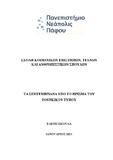| dc.contributor.advisor | Klapsis, Antonis | |
| dc.contributor.author | Σκουλά, Ελένη | |
| dc.date.accessioned | 2021-04-06T06:49:24Z | |
| dc.date.available | 2021-04-06T06:49:24Z | |
| dc.date.issued | 2021-01 | |
| dc.identifier.uri | http://hdl.handle.net/11728/11804 | |
| dc.description | The power and use of the press to influence and manipulate public opinion is not a 21st century privilege or a nation monopoly. On the contrary, this practice has been applied for centuries now with the peculiarity that it is spreading at a different place and intensity internationally, serving mainly governmental and state interests.
Taking into consideration that the Turkish press is gaining momentum and power immediately after the establishment of multi-party system in Turkey and the rise of the Democratic Party, under whose rule the so-called "September events" took place, the present paper deals with its role in them. The way the events are recorded in various newspapers is presented, and a brief comparative analysis with the Greek press is made.
Specifically, starting from the presentation of the events themselves and the attitude of the Turkish people and government officials, the thread of Ariadne unfolds leading to the core of the problems-applicants that led to them. The past disturbed relations, the emergence of the Cyprus problem and the involvement of foreign forces in national issues in the context of the Eastern issue, are presented as the main causes of the vandalism against the Greek compatriots of Constantinople. But the aim is the contribution of the media and particularly the role of the Turkish press to them.
The collection and study of the newspapers of that time, but also the bibliographic record that exists, about the Turkish press and the episodes, proves the lack of freedom of the Turkish press and its interdependence with the state by answering positively to the central question of the paper, whether and to what extent the newspaper of the time triggered the events. Ascertainment which leads to the finding-discovery of expediencies involved in the violent attack against the Greek minority.
The research may be limited to a fragmentary presentation of the events that unfolded in Istanbul, nevertheless it contributes to the historical research due to its originality and the introduction of new research fields. Examining the way in which the Turkish press portrayed the incidents in Istanbul can be a trigger for a study of other areas that experienced this event. | en_UK |
| dc.description.abstract | Η δύναμη και η χρήση του τύπου ως προς την επιρροή και χειραγώγηση της κοινής γνώμης δεν αποτελεί προνόμιο του 21ου αιώνα ούτε μονοπώλιο ενός έθνους. Αντιθέτως η πρακτική αυτή εφαρμόζεται αιώνες τώρα με την ιδιαιτερότητα ότι εξαπλώνεται με διαφορετικό ρυθμό και ένταση διεθνώς, εξυπηρετώντας κυρίως κυβερνητικά αλλά και κρατικά συμφέροντα.
Με γνώμονα ότι ο Τουρκικός Τύπος αποκτά δυναμική και ισχύ αμέσως μετά την καθιέρωση του πολυκομματισμού στην Τουρκία και την άνοδο του Δημοκρατικού Κόμματος, κατά τη διακυβέρνηση του οποίου σημειώθηκαν τα επονομαζόμενα «Σεπτεμβριανά», η παρούσα εργασία πραγματεύεται το ρόλο του σε αυτά. Προβάλλεται ο τρόπος αποτύπωσης των γεγονότων από διάφορες τουρκικές εφημερίδες και γίνεται μια σύντομη συγκριτική ανάλυση με τον ελληνικό τύπο.
Συγκεκριμένα, ξεκινώντας από την παρουσίαση των καθαυτών γεγονότων, τη στάση του τουρκικού λαού και των κυβερνητικών ιθυνόντων ξετυλίγεται ο μίτος της Αριάδνης οδηγώντας στον πυρήνα των προβλημάτων-αιτών που οδήγησαν σε αυτά. Οι παρελθούσες διαταραγμένες σχέσεις, η ανάδυση του Κυπριακού και η εμπλοκή των ξένων δυνάμεων σε εθνικά θέματα στα πλαίσια του Ανατολικού ζητήματος, παρουσιάζονται ως βασικές αιτίες των βανδαλιστικών επιθέσεων εναντίων των Ελλήνων ομοεθνών της Κωνσταντινούπολης. Το ζητούμενο όμως είναι η συμβολή των μέσων μαζικής ενημέρωσης και συγκεκριμένα της εφημεριδογραφίας σε αυτές.
H συλλογή και μελέτη των εφημερίδων της εποχής αλλά και της βιβλιογραφικής παρακαταθήκης που υπάρχει, περί του τουρκικού τύπου και των επεισοδίων, αποδεικνύει την ανελευθερία του τουρκικού τύπου και την αλληλεξάρτηση του με το κράτος απαντώντας θετικά στο κεντρικό ερώτημα της εργασίας, του εάν και κατά πόσο η εφημεριδογραφία της εποχής πυροδότησε τα γεγονότα. Διαπίστωση που οδηγεί στην ανεύρεση των σκοπιμοτήτων που ενείχε η βίαιη επίθεση εναντίον της ελληνικής μειονότητας.
Η εργασία μπορεί να περιορίζεται σε αποσπασματική παρουσίαση των γεγονότων που εκτυλίχθηκαν στην Κωνσταντινούπολη, παρόλα αυτά συμβάλει στην ιστορική έρευνα λόγω πρωτοτυπίας και εισαγωγής νέων ερευνητικών πεδίων. Η εξέταση του τρόπου με τον οποίο ο τουρκικός τύπος αποτύπωσε τα επεισόδια στην Κωνσταντινούπολη μπορεί να αποτελέσει αφόρμηση μελέτης και για άλλες περιοχές που βίωσαν το συγκεκριμένο γεγονός. | en_UK |
| dc.language.iso | el_GR | en_UK |
| dc.publisher | Πρόγραμμα Ιστορίας, Σχολή Επιστημών Υγείας, Πανεπιστήμιο Νεάπολις Πάφου | en_UK |
| dc.rights | Απαγορεύεται η δημοσίευση ή αναπαραγωγή, ηλεκτρονική ή άλλη χωρίς τη γραπτή συγκατάθεση του δημιουργού και κάτοχου των πνευματικών δικαιωμάτων | en_UK |
| dc.subject | Σεπτεμβριανά | en_UK |
| dc.subject | Τουρκικός Τύπος | en_UK |
| dc.subject | Ελληνική Μειονότητα | en_UK |
| dc.subject | Τουρκικός εθνικισμός | en_UK |
| dc.subject | Κυπριακό ζήτημα | en_UK |
| dc.title | Τα Σεπτεμβριανά υπό το πρίσμα του τουρκικού τύπου | en_UK |
| dc.type | Thesis | en_UK |

